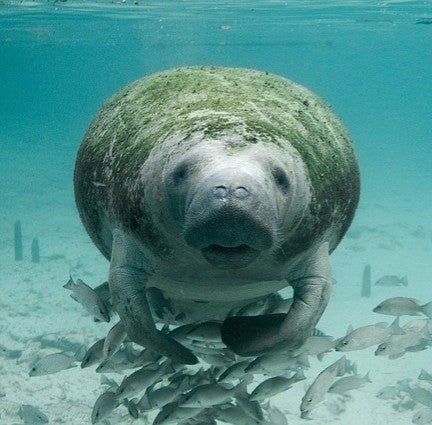Manatees are no longer endangered, according to the U.S. Fish & Wildlife Service, the U.S. government agency in charge of protecting the gentle giants.
Sometimes called, “sea cows,” the slow-moving marine mammals are common around the waters of Fort Myers Beach, Estero Bay, Matanzas Pass and the Gulf of Mexico. Sightings are frequent.
You might get the chance to see a few manatees while enjoying your beach vacation in any of our beautiful beach vacation homes!
Check our available homes for the week you want to visit and join us for vacation! Order our free Vacation Guide to learn more about all the activities in Southwest Florida!
Book now and get summer rate specials, including early bird specials & Florida resident specials!
 And while the FWS reclassified the species from “endangered” to “threatened,” the animals remain very prone to damaging or life-ended encounters with power boats and other threats. Still, the reclassification is seen a a victory for decades-old conservation efforts in Florida, the Caribbean and up along the U.S. Eastern Seaboard.
And while the FWS reclassified the species from “endangered” to “threatened,” the animals remain very prone to damaging or life-ended encounters with power boats and other threats. Still, the reclassification is seen a a victory for decades-old conservation efforts in Florida, the Caribbean and up along the U.S. Eastern Seaboard.
“The Fish and Wildlife Service has worked hand in hand with state and local governments, businesses, industry, and countless stakeholders over many years to protect and restore a mammal that is cherished by people around the world,” said U.S. Secretary of the Interior Ryan Zinke. “Without this type of collaboration and the commitment of state and local partners, this downlisting would not have been possible.”
The rest of the FWS release:

Although the downlisting represents a milestone for the manatee, the agency underscored that important challenges still remain to ensuring the species’ long-term future throughout its range. As such, FWS biologists emphasized that the downlisting will not diminish any existing federal protections that will continue to play a vital role in the recovery of the species. The manatee will also continue to be protected under the Marine Mammal Protection Act.
“While there is still more work to be done to fully recover manatee populations, particularly in the Caribbean, manatee numbers are increasing and we are actively working with partners to address threats,” said Jim Kurth, the U.S. Fish and Wildlife Service’s acting director. “Today we both recognize the significant progress we have made in conserving manatee populations while reaffirming our commitment to continuing this species’ recovery and success throughout its range.”
Today’s estimated population of 6,620 Florida manatees is a dramatic turnaround from the 1970s, when just a few hundred individuals remained. Actions by the FWS, Florida Fish and Wildlife Conservation Commission (FWC), local communities, and industry on behalf of the manatee include:
- Retrofitting water control devices such as those found at locks and levees, resulting in significant decreases in manatee fatalities.
- Power companies working cooperatively with federal and state conservation managers to address future loss of warm water outflows where manatees winter.
- Florida counties implementing manatee protection plans and reducing boater impacts.
- Increasing manatee access to several Florida natural springs while establishing sanctuaries for the wintering manatees in those areas during winter cold snaps.
- FWS working with the U.S. Coast Guard and FWC to minimize manatee collisions with vessels during highspeed marine events and other activities.
- Fishing gear cleanup and recycling programs reducing the threat from fishing gear entanglements.
- Rescue, rehabilitation and release efforts that help save dozens of manatees annually.
Outside the United States, manatee population and abundance estimates are less certain. There are likely as many as 6,300 Antillean manatees spread over a much broader range, from the Mexican Gulf coast to northern Brazil and the Caribbean.
Download the final rule reclassifying the West Indian manatee from endangered to threatened. Learn more about the Florida and Antillean subspecies on the West Indian manatee species profile. Download the Frequently Asked Questions for additional information related to the decision.
